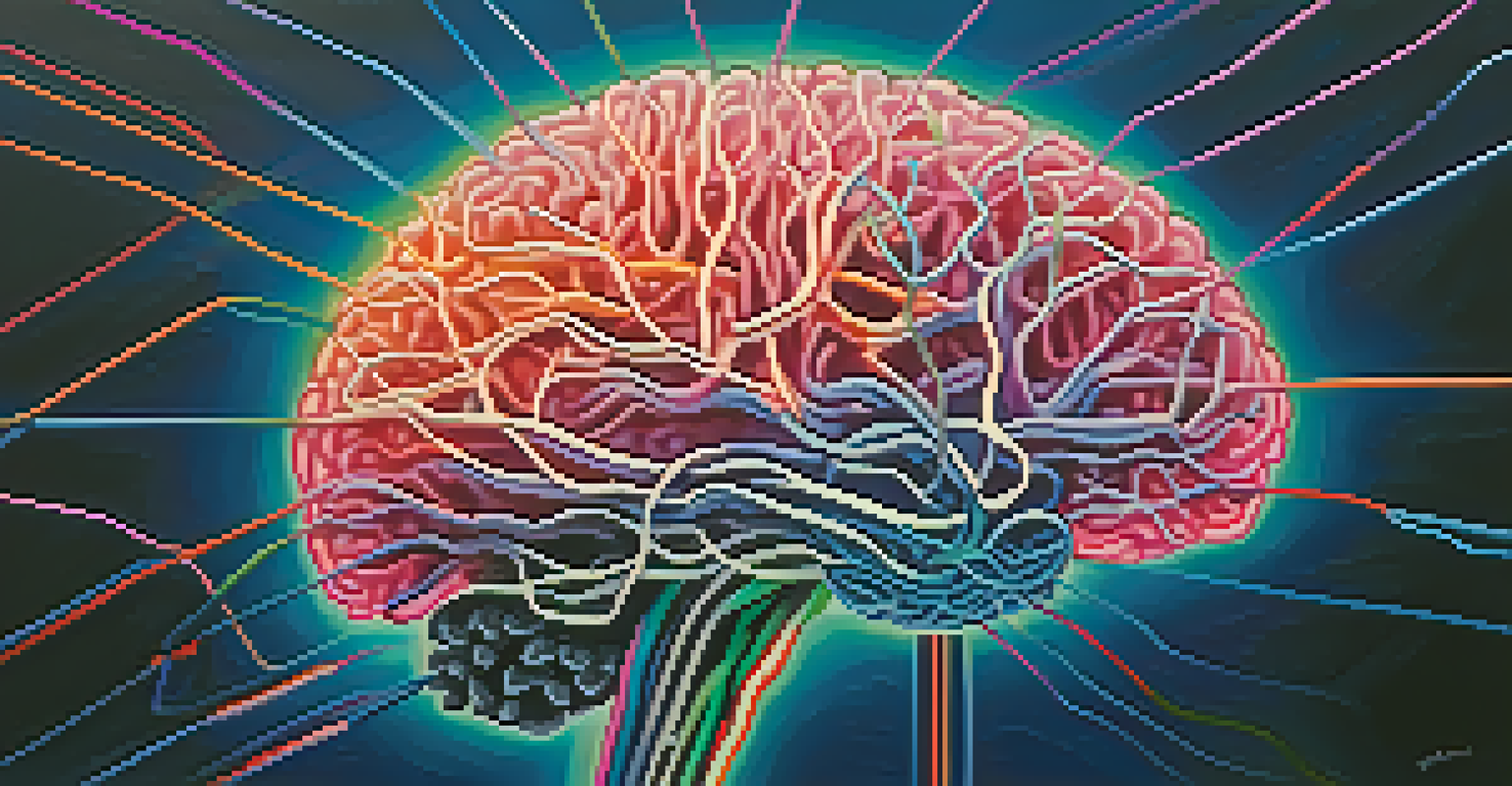How Hallucinogens Can Alter Brain Connectivity and Healing

Understanding Hallucinogens and Their Effects
Hallucinogens are substances that can alter perception, mood, and cognitive processes. Common examples include psilocybin, LSD, and DMT. These compounds interact with serotonin receptors in the brain, leading to profound changes in consciousness and perception.
The mind is everything. What you think you become.
The unique experiences induced by hallucinogens often lead individuals to a deeper understanding of themselves. This introspection can sometimes result in emotional healing and a shift in perspective on life’s challenges.
As we explore the science behind these substances, it becomes clear that they can do more than just create vivid experiences; they have the potential to alter brain connectivity in ways that may foster healing.
How Hallucinogens Alter Brain Connectivity
Research has shown that hallucinogens can increase the connectivity between different regions of the brain. This enhanced communication allows for a more integrated brain function, which can lead to new ways of thinking and problem-solving.

For instance, during a hallucinogenic experience, parts of the brain that typically operate in silos begin to work together, creating a more cohesive experience. This phenomenon can be likened to a symphony, where different instruments collaborate to create beautiful music.
Hallucinogens and Self-Discovery
Hallucinogens can induce profound introspection and emotional healing, helping individuals gain deeper insights into themselves.
Such alterations in connectivity can lead to insights and realizations that are often difficult to achieve through conventional means, which is why many are turning to these substances for therapeutic purposes.
The Role of Default Mode Network in Healing
The Default Mode Network (DMN) is a network of brain regions that is active when we are not focused on the outside world. It plays a significant role in self-referential thoughts, including daydreaming and recalling memories. Hallucinogens can disrupt the DMN, leading to a reduction in self-referential thinking.
The greatest discovery of my generation is that a human being can alter his life by altering his attitudes.
When the DMN is less active, individuals may experience a sense of ego dissolution, which can be liberating. This shift can help people detach from negative thought patterns or traumas that often hold them back.
By altering the DMN's activity, hallucinogens open the door to new perspectives and emotional healing, allowing individuals to break free from the constraints of their past experiences.
Therapeutic Potential of Hallucinogens
Hallucinogens have garnered increasing attention in the mental health community for their therapeutic potential. Clinical studies suggest they can be effective in treating conditions like PTSD, anxiety, and depression.
The healing process may be attributed to the new neural pathways formed during hallucinogenic experiences, which can lead to lasting changes in mood and behavior. This is akin to clearing a clogged path in a forest, allowing for smoother passage and exploration.
Therapeutic Uses of Hallucinogens
Clinical studies suggest that hallucinogens have significant therapeutic potential for treating conditions like PTSD, anxiety, and depression.
As researchers continue to investigate these substances, the hope is to integrate their use into conventional therapies for more holistic healing approaches.
Personal Stories of Transformation
Many individuals have shared their transformative experiences with hallucinogens, often describing a sense of rebirth or profound clarity. For example, people have reported overcoming deep-seated fears or traumas after just one session.
These personal narratives highlight the potential of hallucinogens to facilitate significant psychological breakthroughs. Each story serves as a testament to the power of altered states of consciousness in fostering healing.
Hearing these accounts can inspire others to explore their own journeys of self-discovery and healing, showcasing the profound impact these substances can have on mental health.
Challenges and Risks Involved
Despite their potential benefits, hallucinogens come with risks that cannot be ignored. For some individuals, especially those with a history of mental health issues, these substances can trigger adverse reactions or exacerbate conditions.
It’s crucial to approach their use with caution and ideally under supervision in therapeutic settings. Just as you wouldn’t hike a treacherous mountain without a guide, exploring hallucinogens should be done with care.
Caution with Hallucinogen Use
Despite their benefits, hallucinogens carry risks, particularly for those with mental health issues, necessitating cautious use under supervision.
Awareness of these challenges ensures that individuals can make informed decisions about their healing journeys while maximizing safety.
The Future of Hallucinogen Research
As interest in hallucinogens continues to grow, so does the body of research surrounding their effects and potential applications. Universities and research institutions are increasingly focusing on the therapeutic uses of these substances.
Future studies aim to refine our understanding of how hallucinogens can be safely and effectively integrated into treatment protocols. This could pave the way for groundbreaking therapies that redefine mental health care.

By exploring the depths of the human psyche through scientific inquiry, we may unlock new pathways to healing that were previously considered unconventional.